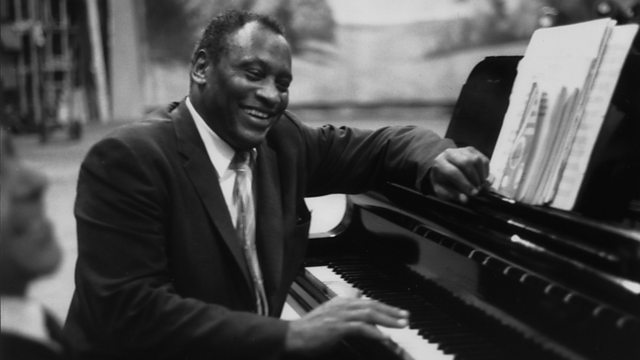Paul Robeson: Singer, actor and civil rights activist
Bridget Kendall charts the changing fortunes of one of America’s greatest performers, with expert guests Gerald Horne, Shana L Redmond, and Tayo Aluko.
The multi-talented Paul Robeson could have turned his hand to pretty much anything he set his mind to: lawyer, athlete and linguist were just some of the career paths he could have taken. But he chose to become an actor and singer, and in doing so reached into the lives of huge numbers of people as one of the most popular American entertainers of his time.
Outspoken on the issues of racism, colonialism and the rights of workers, he used his popularity to campaign against the injustice he saw in many countries across the world – not just injustice suffered by his fellow African Americans.
During the Cold War, his support for Soviet-style communism was deemed unacceptable by the American establishment, and some set out to destroy his career.
Joining Bridget Kendall to examine Paul Robeson’s life are Dr Gerald Horne, the Moores Professor of History and African American Studies at the University of Houston and the author of Paul Robeson: The Artist as Revolutionary; Dr Shana L Redmond, Professor of Musicology and African American Studies at the University of California, Los Angeles, and the author of Everything Man: The Form and Function of Paul Robeson; and Tayo Aluko whose one-man play Call Mr Robeson has won numerous awards and toured countries around the world since its premiere in 2007.
Photo: Paul Robeson
Credit: Keystone Features/Getty Images
Last on
More episodes
Broadcasts
- Thu 22 Oct 2020 09:06GMTΒι¶ΉΤΌΕΔ World Service
- Thu 22 Oct 2020 23:06GMTΒι¶ΉΤΌΕΔ World Service
- Sat 24 Oct 2020 15:06GMTΒι¶ΉΤΌΕΔ World Service News Internet
- Sun 25 Oct 2020 15:06GMTΒι¶ΉΤΌΕΔ World Service except News Internet
- Mon 26 Oct 2020 03:06GMTΒι¶ΉΤΌΕΔ World Service
Featured in...
![]()
Music and musicians—The Forum
Why does the world sound like it does?
Podcast
-
![]()
The Forum
The programme that explains the present by exploring the past



